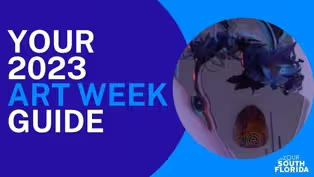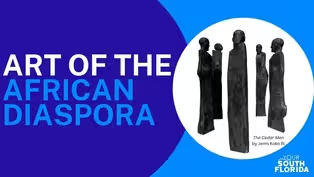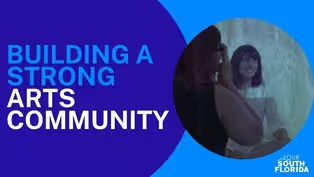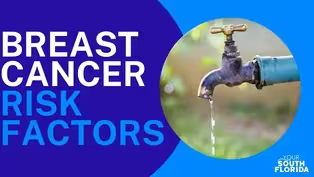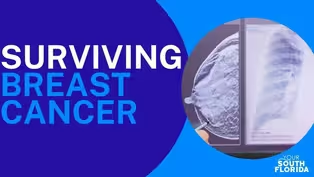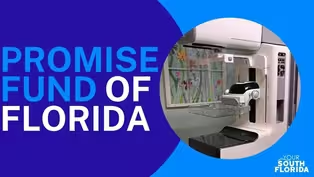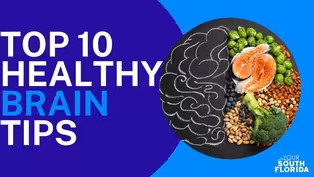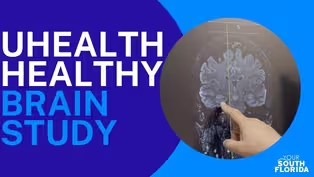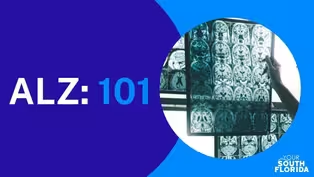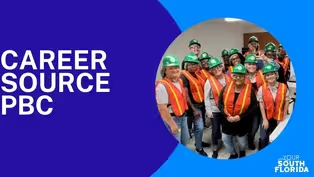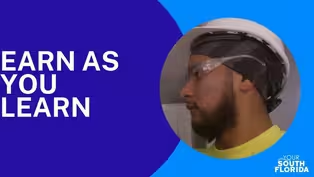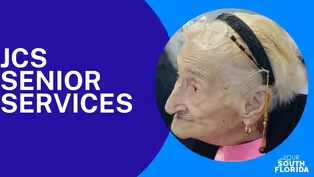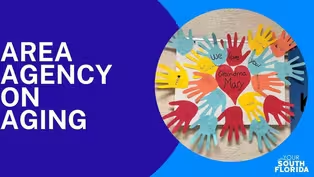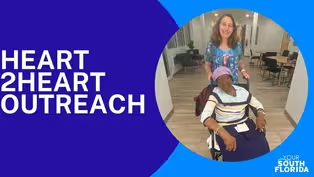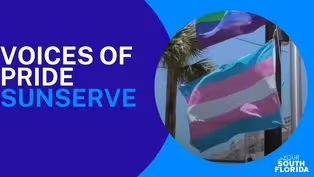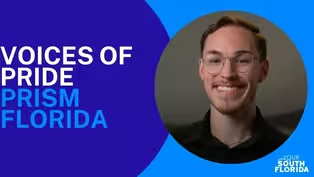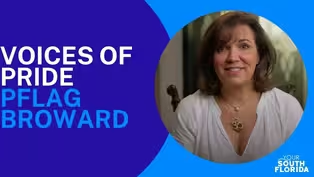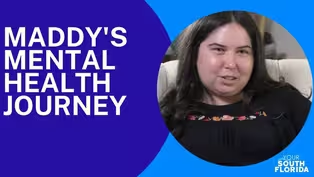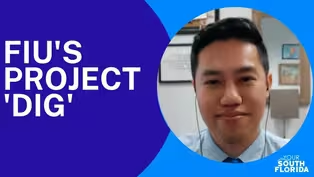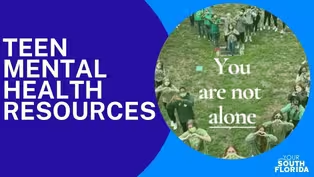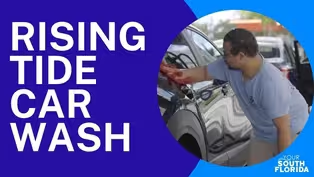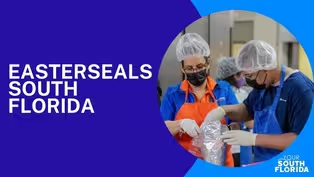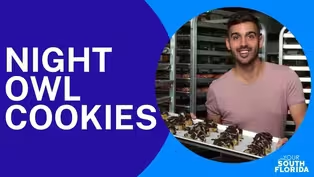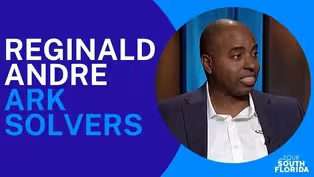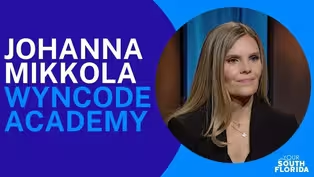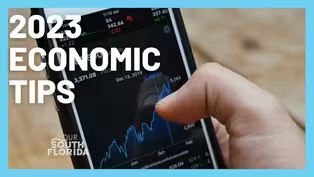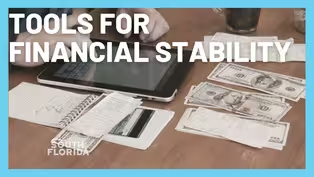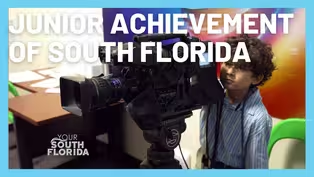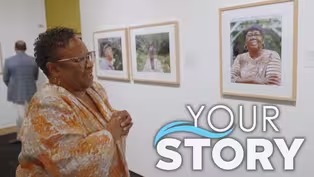Your South Florida
Latest TIPS for Breast Cancer Prevention and Treatment.
Clip: Season 7 | 11m 31sVideo has Closed Captions
Join us in this important conversation about breast cancer prevention and treatment.
Join us in this important conversation about breast cancer prevention and the latest treatments. Dr. Louise Morell, a medical oncologist and medical director of the Lynn Cancer Institute at Baptist Health South Florida, and Gabriel Bower, a breast cancer survivor, share their insights and experiences.
Problems playing video? | Closed Captioning Feedback
Problems playing video? | Closed Captioning Feedback
Your South Florida is a local public television program presented by WPBT
Your South Florida
Latest TIPS for Breast Cancer Prevention and Treatment.
Clip: Season 7 | 11m 31sVideo has Closed Captions
Join us in this important conversation about breast cancer prevention and the latest treatments. Dr. Louise Morell, a medical oncologist and medical director of the Lynn Cancer Institute at Baptist Health South Florida, and Gabriel Bower, a breast cancer survivor, share their insights and experiences.
Problems playing video? | Closed Captioning Feedback
How to Watch Your South Florida
Your South Florida is available to stream on pbs.org and the free PBS App, available on iPhone, Apple TV, Android TV, Android smartphones, Amazon Fire TV, Amazon Fire Tablet, Roku, Samsung Smart TV, and Vizio.
Providing Support for PBS.org
Learn Moreabout PBS online sponsorshipBreast cancer is the most common cancer in women in the United States and around the world.
The American Cancer Society estimates nearly 300,000 new cases of invasive breast cancer will be diagnosed in US women this year alone.
And nearly 44,000 women will die from it.
Most at risk are Black women with the highest rates of death and a higher chance of developing breast cancer before the age of 40 than white women.
But with advances in breast cancer research and treatments, and most importantly, with early detection from mammograms, survival is possible.
Joining me now to talk more about breast cancer prevention and the latest in treatments is Dr. Louise Morrell, medical oncologist and medical director of the Lynn Cancer Institute, part of Baptist Health South Florida at Boca Raton Regional Hospital.
And Gabriele Bauer, a breast cancer survivor.
Thank you both so much for being here.
Gabriele, I should say.
Thank you so much.
Thanks, Pam.
Doctor, let's start with you.
Let's talk about the latest research when it comes to breast cancer.
What are we finding out?
Well, I think that, first of all, we know that there's a variety of breast cancers, but what most women would like to understand and what I actually start with explaining, is that the whole problem of breast cancer originates from that single kind of cell unique to the milk duct that can produce milk.
And so that's why we talk about estrogen producing and all of those things because it relates to that milk duct cell that is the origin or the thing that's growing in an abnormal fashion.
And you can have ductal carcinoma inside the duct, a cancer that can't really spread but could transform into invasive ductal cancer.
You can have infiltrating ductal carcinoma, which is the most common type.
You can have a type called lobular, which is something that starts further out in the duct.
But either way, it's the same cell of origin that we're tackling and that we're trying to detect at the earliest stage.
Let's talk about that early detection, if you will.
And you and I were just speaking moments ago about how it's been out in the news that now the recommendation for women to start their breast cancer screenings was originally from 50, now to 40.
So kind of elaborate for us on that, because a lot of women do start their screenings, their mammography and sonograms much earlier than that, don't they?
40 has been the age of benefit for mammography, except for one thing, which is when it's either in the family or a genetic predisposition, and then it's earlier than that.
But otherwise, 40 is the standard year to start.
We've had wavering from different countries, different studies.
Should it be every other year before age 50?
Should it be starting at age 50?
But the bottom line is, you can get breast cancer in your 40s and you're not gonna have a chance at finding it at that earliest stage.
The other thing that's tricky about these studies is they're only looking at survival.
But we're looking, can we avoid chemotherapy, can we avoid radiation, can we avoid mastectomy?
Those are all things that are more likely if you detect the cancer early.
So we're recommending 40 every year, unless you have a reason to do it earlier.
There'll be some debate and there'll be some discussions with women on pros and cons, but I think that's gonna be our standard recommendation from the women's center, from the radiology departments and things like that.
And every year.
Once you start, every year.
Gabriele, you are a breast cancer survivor.
Yes.
And you were, you discovered your breast cancer through mammography, did you not?
Yes.
I did start when I was 40 to have it done once a year.
And on my 48th birthday, they found breast cancer.
Walk us through that.
What was that like for you when you were diagnosed?
First of all, you're in disbelief and really thinking they made a mistake.
Let's check again and check again.
And then when the reality hits, for me, it was like, "Oh my god, what's gonna happen to my children and what's gonna happen to my husband?"
Because for me, cancer is death in the first moment.
So it was very...
It was, yeah, part of my dark days, I have to say.
It was hard.
It was very difficult, yes, to accept.
It was very difficult to accept it.
And then you went on to have genetic testing, did you not?
With Dr. Morrell, right?
Yes, yes, Dr. Morrell.
Yes, we had the genetic testing.
And on top of that, found out that I have the BRCA gene, so I was positive.
So, in my case, it was from maybe having an option of lumpectomy to immediately having a double mastectomy and chemotherapy radiation, and then also having the- [Dr. Morrell] The hysterectomy, .
Yes, having the hysterectomy, I'm sorry.
I will mention that the change in genetic testing happened between 2012, 2015.
So anybody who tested before that time negative would be eligible to retest because we do have a broader test that now looks at other gene.
PALB2 is one of them.
CHECK2 is another one.
So there is a opportunity to identify some people who tested negative in the past, but they don't...
The most potent ones are the BRCA1 and the BRCA2.
And one of the questions that comes up quite a bit, which I don't think was your situation, but it's worth clarifying, is the Ashkenazi Jewish, so Eastern European Jewish population does have this gene at a much higher frequency.
So anyone who is in that population who's had breast cancer in their family should be tested.
But any woman can have this gene.
So it isn't only that Jewish population, it's any woman can have a mutation of the BRCA gene.
And then when you have that, it's about a 50% chance that other family members or offsprings could inherit it.
But if you don't have it, if you have normal genes, you can't pass on something you don't have.
So even Gabriele was asking about her children.
So they should be tested at some point, yes?
Right.
So the thing we believe, and I strongly believe, about when to do that testing, 'cause these are gonna be your genes from the minute you were conceived.
So you could test any time and you're gonna have the same result.
But if you think about a young adult, 17, 18, 16 years old, facing thoughts about what to do with your breast or your ovaries or worrying about that when you can't do anything about it, and shouldn't do anything about it, is really something that we try to avoid.
25 is the earliest that we would have any action that we would take, such as early screening.
So we're guiding people to do it mid-20s, a little earlier.
Also, insurance issues and things like that are more likely to be straightened out.
And for men, I think their age of being impacted by this because it's considerably less, is more like 40.
But if they're having family planning, it's something you might wanna do earlier.
Gabriele, let's talk a little bit about how you walked your way through this journey.
'Cause you and I were talking about, you said there was a lot in the genetic testing.
You had the double mastectomy, you had a hysterectomy.
You had a lot.
Yes.
They had to remove your lymph nodes.
Yes.
Yes, so I was very blessed because I have an incredible family community.
The community overall was just a very, stronghold for me.
My neighbors, my friends, the Lynn Cancer Institute.
I mean, it's not just one doctor looking at you, it's a whole team making decisions of every step.
And it's not like they see your screen and say, "Okay, this is what we're gonna do on this month."
It's like every step will be rechecked with the whole team, and that gave me the comfort that I'm definitely in good hands and decisions, what will be made are the best for me and my situation.
So that was definitely a huge support for me.
Having a team of people around you.
Yes.
And doctor, talk about that multimodality.
I mean, that's a really important part of how you treat patients, correct?
Yes, as you experienced, there's so many pieces to this, and what we wanted to do is bring expertise to each piece.
So the imagers, the people who are looking at the MRI and doing the biopsies, the pathologists, understanding what additional tests and why and which tissue it should be doing, are people that you don't even think of as part of your clinical team.
But every single area, radiation, medical, genetics, all of these areas have had advancements.
Even the social work and the psychological things and the support services that we need to get through this the best we can, all of those, we wanted experts and we wanted to talk to each other and we wanted to meet the patient and have that person's input.
And so this has been an efficient way, that within a week of diagnosis, everyone can see those patients meet together, put together a plan, and then talk to each other.
What's been so gratifying for me, because we've been doing this for many years now, and it's everyone.
It can be a 95-year-old who wants to do very little, but let's make sure we're doing the right things.
It can be somebody who's very young and is thinking about having children and should they preserve their eggs, and how do we integrate that into care?
It allows us to all be part of that thought process to learn from each other, but also to very early adopt things that we might not need to do that we used to do.
So it's been a very gratifying way for the patients, for the doctors, for everyone to take care of patients.
And very personalized, it sounds, for each person's needs.
Yes.
And I know too, Gabriele, that you are involved with the beautiful program.
Talk a little bit about that and take us through the journey.
Because you're a hairdresser.
Yes.
And you said that one of the things that was the worst part of your, the hardest part of your journey was going through chemotherapy and losing your hair.
Yes, of course.
So, for me, that was definitely very difficult to overcome.
And just to find the right solution and, what am I gonna do, where am I gonna find the wig, is it gonna be the right fit?
I wanted to continue to work.
I really did not wanted to, during that time, share my story, so I wanted to stay as normal of a day routine as possible.
So after I went through my process, my incredible staff at Gabriele Kafer definitely met up with a beautiful program to help and support for patients who go through the chemotherapy, losing hair, and to meet them up with the perfect wig.
It's all voluntary, it's donated.
And simply to give them that feeling of, this is one thing I do not have to worry about.
So the beautiful program meets every month, every second Monday of the month where we share a makeup kit.
And people can learn about the different makeups when they don't have their eyebrows, the lashes.
And Gabriele Kafer comes in that situation and introduces how to work with the wigs and how we can fit them for them correctly.
But it's not all about that either.
It's really to listen to their stories.
Because everybody shares what they're going through, and that's personally, from what I learned, is more important for them.
Like, it's nice to say, "Okay, how can I make myself feel better?"
But really, it's about to hear from each other what they're going through, what they went through, and how they feel.
And I have to say, this feeling of release, of breathing, saying, "Ah, I'm not alone, I'm here, and there is a plan."
You know what I mean?
That is, for me, the biggest reward to be part of that beautiful program.
Gabriele, so nice to meet you.
Doctor, thank you so much for being here, for all this information.
We really appreciate it.
Thank you.
Your Expert Guide to Miami Art Week 2023
Video has Closed Captions
Clip: S7 | 28m 44s | We share tips for your best Miami Art Week 2023 experience. (28m 44s)
Discover The Art Transforming Opa-locka
Video has Closed Captions
Clip: S7 | 10m 27s | Discover The Art Transforming Opa-locka. (10m 27s)
Dennis Scholl on Housing Help for Artists
Video has Closed Captions
Clip: S7 | 8m 51s | Dennis Scholl discusses South Florida's burgeoning art scene & its impact on the economy. (8m 51s)
Video has Closed Captions
Clip: S7 | 9m 38s | Breast cancer researchers are studying an alarming trend in South Florida. (9m 38s)
Latest TIPS for Breast Cancer Prevention and Treatment.
Video has Closed Captions
Clip: S7 | 11m 31s | Join us in this important conversation about breast cancer prevention and treatment. (11m 31s)
Connecting Women to FREE Mammograms
Video has Closed Captions
Clip: S7 | 6m 14s | Early detection is vital to breast cancer survival. (6m 14s)
TOP 10 Tips to Help You LOVE Your Brain
Video has Closed Captions
Clip: S7 | 6m 53s | Learn about early detection and lifestyle changes for maintaining brain health. (6m 53s)
Healthy Brains Helping Researchers Fight Alzheimer's
Video has Closed Captions
Clip: S7 | 7m 9s | We look at how to better treat and prevent Alzheimer’s and related dementias. (7m 9s)
All You Need to Know About Alzheimer's
Video has Closed Captions
Clip: S7 | 12m 58s | We shed light on the latest developments in Alzheimer's care and support. (12m 58s)
Vocational & Workforce Resources
Video has Closed Captions
Clip: S7 | 10m 55s | CareerSource PBC is helping job seekers learn the skills they need. (10m 55s)
Video has Closed Captions
Clip: S7 | 10m 44s | Get the details on a new program making higher education more accessible. (10m 44s)
Video has Closed Captions
Clip: S7 | 5m 7s | We get an inside look at how apprenticeships can be a win-win for students and businesses. (5m 7s)
JCS Providing Meals & Community
Video has Closed Captions
Clip: S7 | 6m 2s | Jewish Community Services of South Florida works to maintain the health of seniors. (6m 2s)
Helpline for Older Adults & Caregivers
Video has Closed Captions
Clip: S7 | 9m 35s | Learn how the Area Agency on Aging of Palm Beach/Treasure Coast is helping older adults. (9m 35s)
Video has Closed Captions
Clip: S7 | 8m 55s | Heart2Heart Outreach of South Florida provides care for lonely seniors. (8m 55s)
Voices of PRIDE: Transgender Community
Video has Closed Captions
Clip: S7 | 5m 59s | We visit SunServe in Wilton Manors to hear from members of the Transgender community. (5m 59s)
Voices of PRIDE: Gen Z & LGBTQ+
Video has Closed Captions
Clip: S7 | 3m 27s | PRISM is a non-profit providing resources to South Florida' LGBTQ+ Gen Z community. (3m 27s)
Voices of PRIDE: A Parent's Perspective
Video has Closed Captions
Clip: S7 | 3m 17s | Lisa McCourt shares her perspective as the mother of a Transgender daughter. (3m 17s)
Video has Closed Captions
Clip: S7 | 4m 12s | We profile Maddy Tasini and her mental health journey. (4m 12s)
FIU Addresses Shortage of School Mental Health Professionals
Video has Closed Captions
Clip: S7 | 6m 34s | FIU has a new program that helps students with mental health issues. (6m 34s)
Mental Health Resources for Teens & Families
Video has Closed Captions
Clip: S7 | 12m 41s | Host Arlene Borenstein looks into local resources for at-risk teens and their families. (12m 41s)
Rising Tide Car Wash's Neurodivergent Workforce
Video has Closed Captions
Clip: S7 | 7m 3s | Rising Tide Car Wash is a successful business thanks to it's non-traditional workforce. (7m 3s)
Culinary Arts Program for Neurodivergent Students
Video has Closed Captions
Clip: S7 | 6m 1s | For decades, Easterseals South Florida has been helping neurodivergent students. (6m 1s)
Andrew Gonzalez l Road to Entrepreneurship
Video has Closed Captions
Clip: S7 | 7m 30s | Miami native Andrew Gonzalez followed his dream of making and selling late-night cookies. (7m 30s)
Reginald Andre l Road to Entrepreneurship
Video has Closed Captions
Clip: S7 | 7m 55s | Hear Reginald Andre talk about his inspirational entrepreneurial journey. (7m 55s)
Johanna Mikkola l Road to Entrepreneurship
Video has Closed Captions
Clip: S7 | 11m 6s | Johanna Mikkola saw the value in bringing a unique brand of coding bootcamps to S. Florida (11m 6s)
Your 2023 Economic Tips l Your South Florida
Video has Closed Captions
Clip: S7 | 9m 42s | Dr. Albert Williams shares his tips for financial health. (9m 42s)
Tools for Financial Stability with United Way Miami
Video has Closed Captions
Clip: S7 | 6m 27s | Nearly 6 out of 10 Miami households are living in or are on the verge of poverty. (6m 27s)
Junior Achievement of South Florida l Your South Florida
Video has Closed Captions
Clip: S7 | 6m 20s | Junior Achievement of South Florida teaches students about finances and building a career. (6m 20s)
Photographing Boca Raton’s Oldest Neighborhood | Your Story
Video has Closed Captions
Clip: S7 | 7m 22s | Founded in 1915, Pearl City is the oldest neighborhood in Boca Raton. (7m 22s)
Providing Support for PBS.org
Learn Moreabout PBS online sponsorshipSupport for PBS provided by:
Your South Florida is a local public television program presented by WPBT
